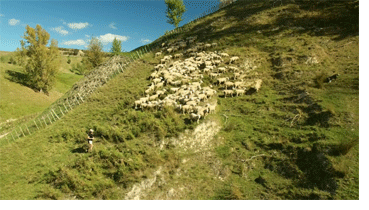|
|
|
|
|
|
|
Day 19
Breakfast: Served at the hotel starting at 6:30am. Morning: Around 9am, we will board our bus for an approximately 1-hour drive to Rubicon Valley's working farm. The farm is nestled in the Southern Alps and home to more than 3,000 sheep. As we begin our Back Country exploration of the farm around 10:30am, we’ll first have the opportunity to see the impressive teamwork of sheepdogs and sheep. We will get an in-depth look at the entire process of this farm—from the dogs rallying the sheep in the paddock and shuffling them from pen-to-pen to watching these long-haired Romney sheep being shorn. While here, we'll also meet some of the farm's other furry residents, including alpaca. After our look into the process as a whole, we'll board a 17-seater, four-wheel-drive vehicle and set off on the backroads of the property for one of the sheep shearing sheds where we'll learn about the work that takes place here, including the wool-grading process. Our small group will gain a deeper understanding of farm life and the importance of sheep in New Zealand when we speak to the local farmers, Chris Lowe and his wife, Del. Chris is a third-generation livestock farmer—primarily sheep, but sometimes cattle and crops as well—and continues the tradition today with his family-run operation which includes Del and their adult children. As we get to know Chris and Del, we’ll also engage in a conversation about the validity of New Zealand Tourism’s slogan “100% Pure New Zealand” and the effects the debate it caused has had on farmers like the Lowes. What began as a piece of marketing touting New Zealand’s world-famous natural beauty, has sparked a country-wide debate. Scientists, environmentalists, and New Zealand’s Green Party see the “100% Pure” brand as an environmental statement as well and argue that the country’s intensification of agriculture is threatening this “pure” status. Farming has long been the backbone of New Zealand’s economy, and is a significant part of its cultural and aesthetic landscape. On the other side of the coin, many farmers believe they have been unfairly targeted by these emission and run off restrictions that make farming financially unsustainable, and argue that the need to provide food should be seen as a priority. During this hour-long conversation, we’ll have around 40 minutes to ask the Lowes any questions we may have about their first-hand experiences with this complex issue. Lunch: Around 12:30pm, we’ll gather for an included local lunch at the sheep station. Afternoon: Around 1:45pm, we will continue our journey to Hokitika via motorcoach. Hokitika is a small farming community with a rich history. It boomed in the 1860s with the gold rush, and was, at that time, the busiest port in the country. A sandbar at the mouth of the Hokitika River proved a dangerous impediment, claiming many ships and lives, but still the port bustled and was a major point of entry during the gold rushes of the 1860s and 1870s. Today, it's home to a coastal community, and author Eleanor Catton recently used the town as the setting for her Man Booker-award winning novel, The Luminaries. Upon arrival around 4:30pm, we will check in to our small, family-owned hotel and receive room assignments. Our hotel may include a dining and lounge area. Room amenities include TV, wireless Internet, bathroom, and air-conditioning. You will have a little over an hour to settle in before we set out on an orientation walk around the vicinity with our Trip Experience Leader around 5:30pm. Following our 30-minute walk, we will return back to the hotel. You will have about an hour of free time to relax at the hotel. Or, perhaps you'll choose to discover more of Hokitika with our Trip Experience Leader during a 30-minute walk to the local beach. Dinner: On your own. Your Trip Experience Leader will be happy to suggest some local restaurants. Evening: Your evening is free to enjoy Hokitika. Perhaps you’ll discover something interesting off the beaten path as you wander the streets on your own. Freedom to Explore Make the most of your time in Hokitika with these suggestions for independent exploration from our local regional office. Your Trip Experience Leader will lead the activity with the most traveler interest.
|
|
|
|
|
|||
|
11/17/22 |
|||
|
|
|
|
|
 Meals included: B D
Meals included: B D